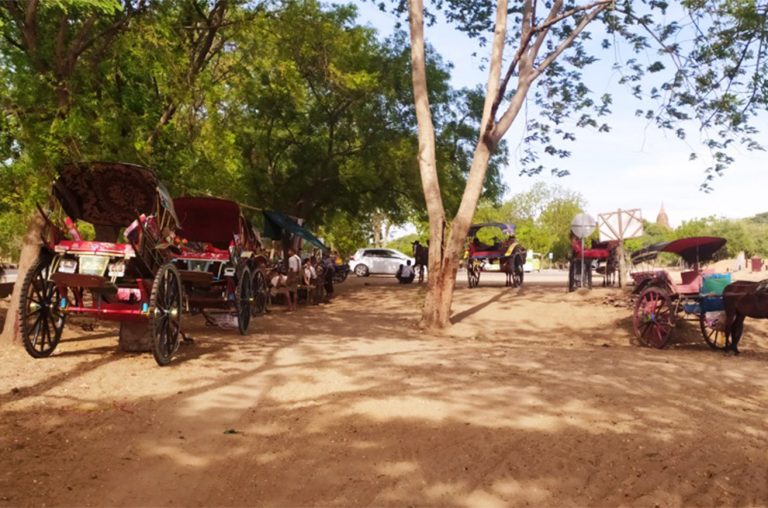Those engaged in horse-cart riding businesses in Bagan cultural heritage zone are experiencing adversities with no passengers although the temples are reopened for inbound travellers. The local people relying on that business are struggling for livings, said U Myo Han, a horse-cart rider. Bagan cultural heritage zone, a UNESCO World Heritage Site, was eerily empty due to the tight restriction period of the coronavirus pandemic. After the three-month restriction period, the inbound tour was reopened from the first week of July. However, there is no passenger for horse-cart riders. They are bitterly facing financial hardship.
Prior to the coronavirus pandemic, the historical temples in the ancient city were packed with a large number of pilgrims and tourists throughout the year, allowing the local people earning a healthy income. There are about 300 horse-cart riders in Bagan-NyaungU area, yet they receive zero passengers even after the restriction for the inbound tour has been relaxed. Additionally, feed for horses is expensive. It costs approximately K3,000 per horse a day, said U Tin Soe, a horse-cart rider. Earlier, they earned around K50,000-80,000 every day. At present, the temples reopened between 9 am and 4 pm. About 450 pilgrims come to the zone per day on the weekdays and more visitors were seen during the weekends. Over 1,000 visitors are seen in the famous historical temples of Bagan city; Shwezigon Pagoda, Lawkananda Pagoda, Tuyintaung Pagoda, Tantkyitaung Pagoda, Htilominlo Temple, Ananda Pagoda, Bu Pagoda, Thatbyinnyu Temple, Dhammayangyi Temple, Sulamani Temple, Payathonezu Temple, Mahabodhi Temple, Sulamani Temple, Manuha Temple, Gawdawpalin Temple, Myazedi Temple, Nanpaya Temple, and other famous pagodas during the weekends, according to the board. The pilgrims are registered on the data of the pagoda trustees’ board. The visitors must wear facemasks and wash hands, in line with health guidelines issued by the Ministry of Health and Sports, said U Tin Hla Oo, secretary of Trustees Board. Earlier, during the high season from November to April, Bagan is packed with local pilgrims and tourists. They used to visit Bagan to observe the temples and stupas and view the sunset. The horse-riding businesses, motorcycle and electric bike rental businesses, hotels, motels, and guesthouses were earning well in the high season, along with souvenir businesses. Those businesses created jobs for local residents.
The local tourism industry is battered by the viral disease and those engaged in local transportation rental business (three-wheel, boat, horse-riding, car, e-bike, cycle, and motorcycle), hotels and guesthouses, restaurants and souvenir shops are suffering from this. The businesses relying on tourism are nearly closed amid the pandemic negative impacts.—Ko Htein, Ko Khant
(Translated by Ei Myat Mon)



